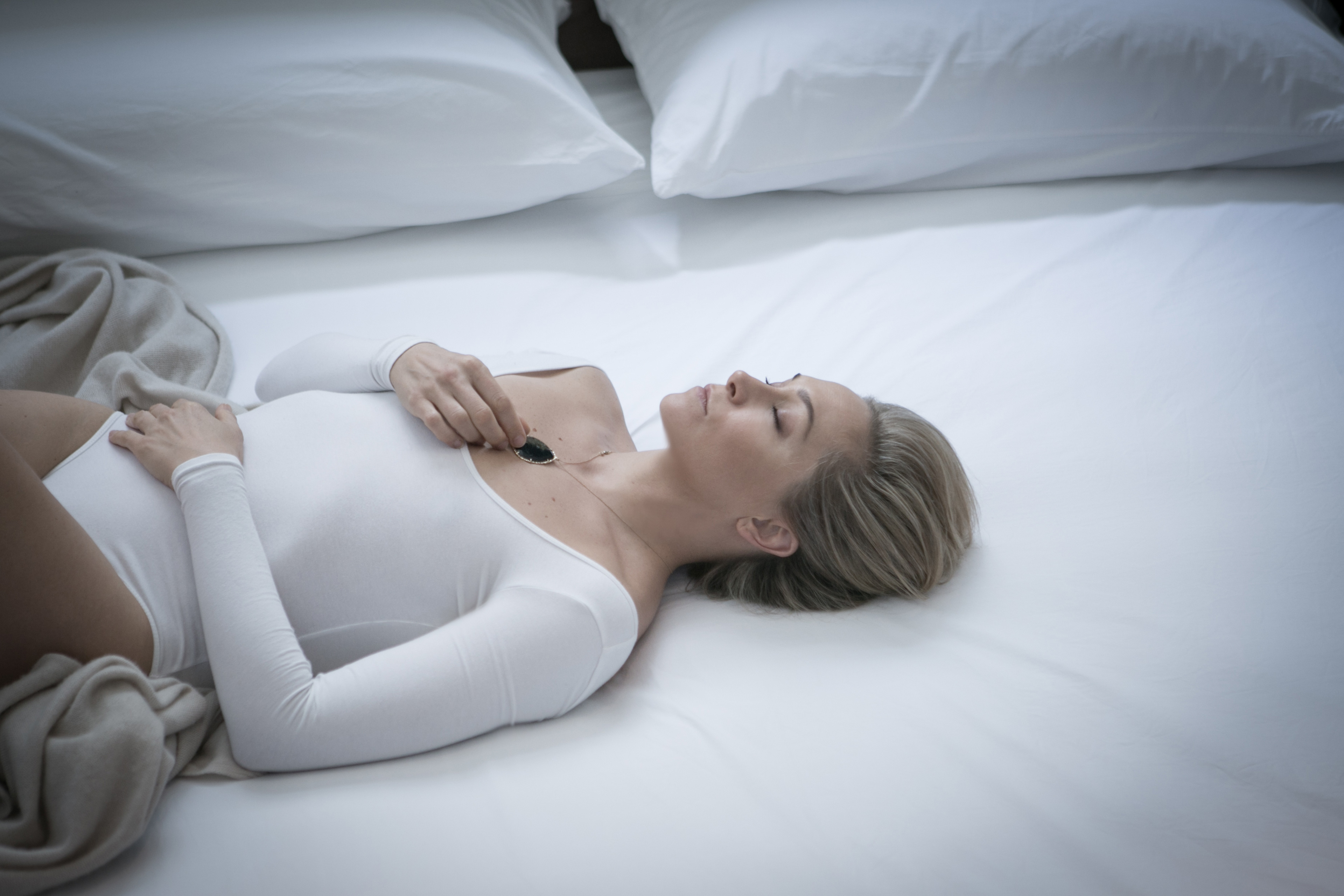Schlaf und Immunsystem
Steigern Sie Ihr Wohlbefinden, indem Sie Schlaf zur höchsten Priorität erklären.

Erholsamer Schlaf ist neben ausgewogener Ernährung und körperlicher Betätigung der dritte Grundpfeiler unserer Gesundheit. Den sehen wir oft als selbstverständlich an, dabei sind Gehirn und Körper zwingend auf gute Nachtruhe angewiesen. Im vergangenen Jahrzehnt hat der Schlaf für viele Menschen an Bedeutung verloren. Nicht nur schlafen wir zu wenig – im Durchschnitt 6:35 Stunden pro Nacht –, sondern die Hälfte der Bevölkerung kämpft auch noch mit Einschlafstörungen.
Noch kritischer wird es, wenn Ereignisse in unserem Leben Unsicherheit entstehen lassen. Unausgeglichenheit und Stress rauben uns dann zusätzlich den Schlaf, den wir so dringend bräuchten. Spätestens wenn es zu derartigen Problemen kommt, ist es an der Zeit, unsere Schlafgewohnheiten genauer unter die Lupe zu nehmen und unseren Schlaf zur höchsten Priorität zu machen, um langfristig unsere Gesundheit zu schonen.
Wir alle wissen, dass wir uns ausgeschlafen besser fühlen. Doch wie wichtig der Schlaf für das Immunsystem ist, daran haben viele noch nie gedacht. Studien belegen, dass Schlafmangel oder geringe Schlafqualität das Risiko erhöhen, nach Kontakt mit einem Virus zu erkranken. Außerdem kann bei zu wenig Schlaf auch die Genesung länger dauern.
Ein starkes Immunsystem kommt besser mit Belastungen zurecht, wehrt Infektionen erfolgreicher ab und hilft uns, nach Erkrankungen wieder gesund zu werden. Dieses wehrhafte körpereigene Verteidigungssystem hat viele Aufgaben. Es identifiziert Pathogene wie Viren, Parasiten, Bakterien und Pilze und entfernt sie aus dem Körper. Es neutralisiert von außen eindringende Schadstoffe und bekämpft krankhafte Veränderungen im Inneren des Körpers. Erkennt es Antigene oder Toxine, bildet es spezielle Antikörper oder Zellen, die den Eindringling bekämpfen.
Wer über ein starkes Immunsystem verfügt, ist besser vor Viren geschützt und weniger anfällig für Infektionen. Körperliche Betätigung, gesunde Ernährung, Alkoholverzicht und Vitamine stärken das Immunsystem. Außerdem sollten wir unbedingt auf ausreichenden Schlaf achten, um unsere Abwehr auf wirksame und natürliche Weise zu unterstützen.
Während wir schlafen, schüttet unser Immunsystem eine bestimmte Art von Proteinen aus, sogenannte Zytokine. Diese cleveren Proteine sind in der Lage, Infektionen und Entzündungsherde aufzuspüren, und sind maßgeblich für unsere Immunantwort. Wenn der Körper mit einer Infektion oder Entzündung kämpft oder unter Stress steht, steigt der Bedarf an bestimmten Zytokinen. Bei Schlafmangel kann die Produktion der schützenden Zytokine nachlassen und die Immunantwort schwächer ausfallen. Außerdem werden auch weniger infektionsbekämpfende Antikörper und Fresszellen gebildet, wenn wir nicht genügend schlafen.
Hier also einige Tipps, mit denen Sie Ihrem Immunsystem einen kräftigen Schub verpassen können:
Vorfahrt für gesunden Schlaf.
Wir alle knapsen beim Schlaf. Wenn wir ihm aber wieder den gebührenden Stellenwert einräumen, stellen wir unsere Gesundheit und unser Wohlbefinden wieder an erste Stelle. Für die meisten Erwachsenen sind sieben bis acht Stunden guter Schlaf pro Nacht optimal. Teenager brauchen neun bis zehn Stunden und jüngere Schulkinder zehn Stunden oder sogar mehr.
Wenn Sie zu mehr Schlaf kommen möchten, ist es am einfachsten, die Schlafenszeiten leicht zu ändern. Ziehen Sie beispielsweise die Einschlafzeit 15 bis 30 Minuten vor und lassen Sie den Wecker 15 bis 30 Minuten später klingeln. So gewinnen Sie 30 bis 60 Minuten dazu.
Fokus auf gute Schlafqualität.
Wie gut Sie schlafen, ist genauso wichtig wie die Schlafdauer. Wenn es Ihnen schwerfällt, einzuschlafen oder wach zu bleiben, sollten Sie Ihr Einschlafritual hinterfragen. Wir haben über die letzten Jahre mit Dr. Jessamy Hibberd zusammengearbeitet, die kognitive Verhaltenstherapie einsetzt, um Patienten mit Schlafstörungen zu behandeln. Auch bei sich zu Hause können Sie eine Menge tun, um zu besserem Schlaf zu finden. Mehr dazu, wie Sie Ihr Einschlafritual neu aufstellen, lesen Sie hier.
Temperaturcheck.
Wenn Sie nachts immer wieder aufwachen, sollten Sie die Temperatur in Ihrem Schlafzimmer kontrollieren. Wenn es unter der Decke zu warm oder zu kalt ist, stört das Ihren Schlafzyklus. Die Folge sind ziemlich unruhige Nächte. Wenn es draußen warm wird, versäumen es viele, rechtzeitig das Winter-Bettzeug durch leichtere Materialien zu ersetzen. Unter einer Bettdecke mit niedrigerer Wärmeklasse wird Ihnen nicht so schnell zu warm. Allein das kann eine völlig neue Schlafqualität bewirken. Außerdem sollten Sie der Frage auf den Grund gehen, welches Füllmaterial in Ihrem Bett verarbeitet wurde. Naturmaterialien sind am besten geeignet. Sie sind atmungsaktiv und lassen die Luft besser zirkulieren als künstliche Fasern oder Schaumstoffe. Rossschweifhaar und Wolle leiten Feuchtigkeit besonders effektiv vom Körper weg und halten Sie deshalb besser kühl.
Lebensmittel für Schlafmützen.
Möglicherweise lohnt es sich auch, auf schlaffördernde Inhaltsstoffe im Essen zu achten. Viele Lebensmittel enthalten diese Stoffe, die wenigsten davon aber in Konzentrationen, die sich im Schlafzyklus bemerkbar machen.
Kirschen, Mandeln und Nüsse haben von Natur aus eine hohe Konzentration an Melatonin, also dem Hormon, das die Schlaf-Wach-Zyklen steuert.
In Kiwis stecken viele schlaffördernde Mineralstoffe wie Calcium, Kalium und Magnesium sowie Serotonin.
Öliger Fisch ist eine reichhaltige Vitamin-D-Quelle. Außerdem regulieren die reichlich enthaltenen Omega-3-Fettsäuren den Serotoninhaushalt.
Proteine aus Pute, Fisch und Huhn haben einen hohen Anteil an Tryptophan, einer Aminosäure, die die Serotoninkonzentration ansteigen lässt.
Kleine Änderungen am Einschlafritual können große Wirkung haben und dazu beitragen, dass das Immunsystem schlagkräftig bleibt. Wenn Sie sich tiefer in diesen Themenkomplex einlesen möchten, empfehlen wir den Schlafratgeber von Dr. Jessamy Hibberd This Book Will Make You Sleep
